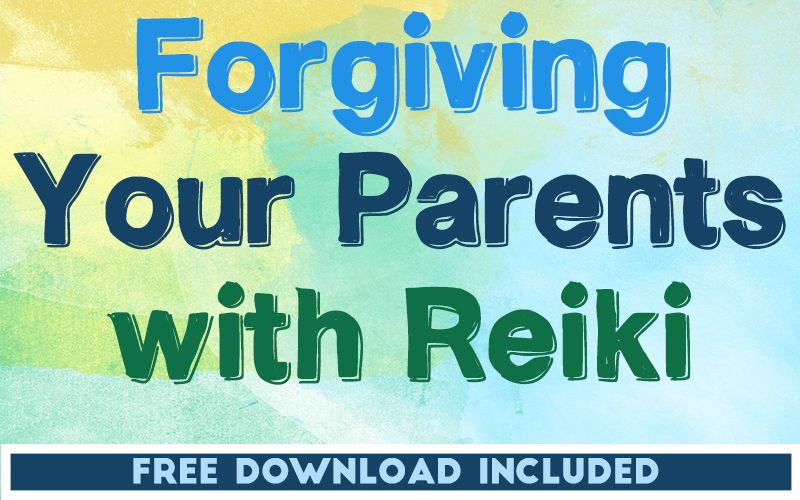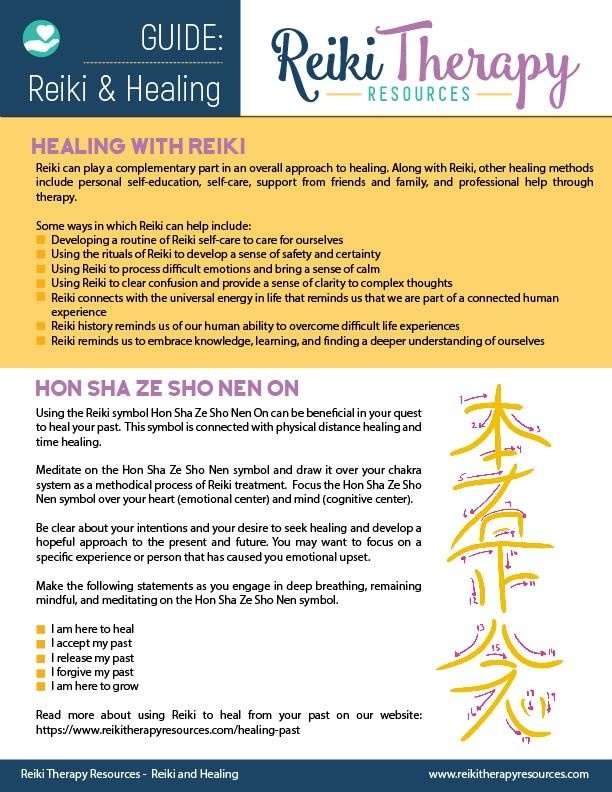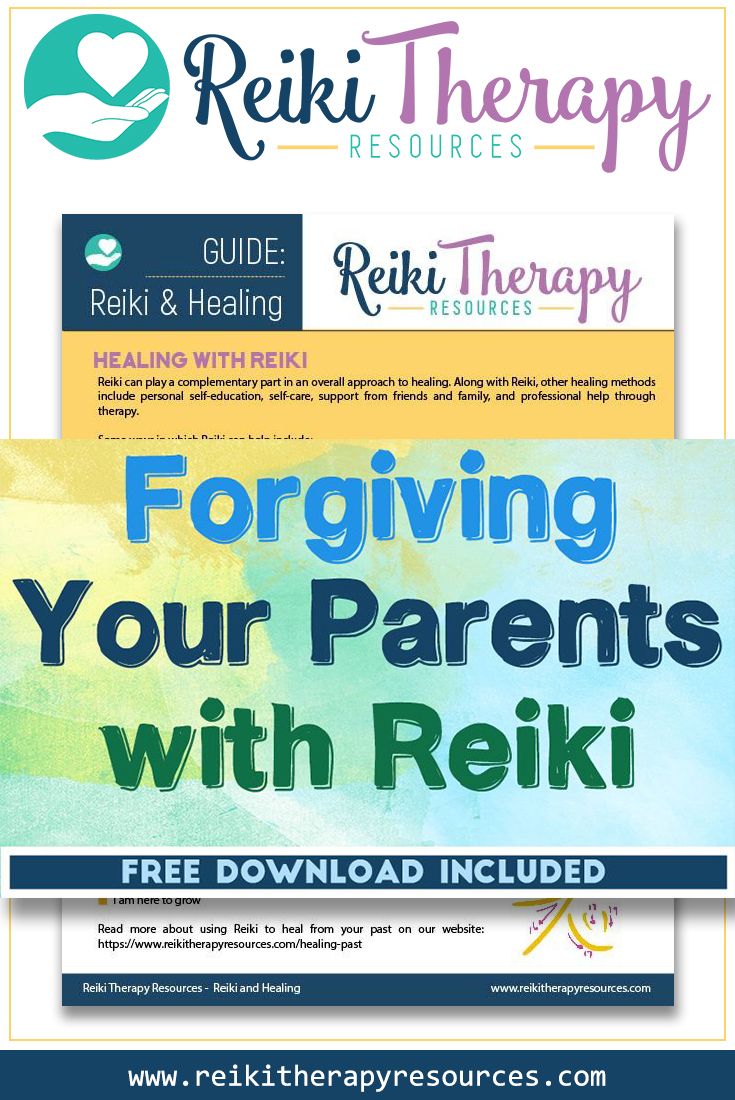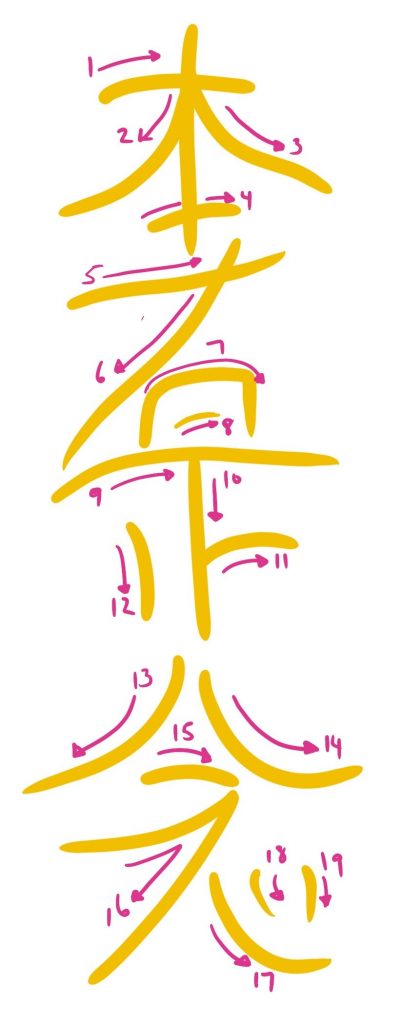
THIS POST INCLUDES:
——————————————–
1. Why should we forgive
2. How to forgive
3. Using Reiki to forgive
4. Free Download Healing with Reiki Guide
WHY SHOULD WE FORGIVE
DISCLAIMER: dealing with trauma and negative past experiences can be upsetting. Reiki should not be a substitute for therapy or working through psychological issues. Reiki is considered a complementary form of self-care to help aid us through the process of improving our mental health.
We’ve previously discussed the idea of healing the past with Reiki. In that post, we discussed how our past can impact us and how we might use Reiki to heal those past hurts.
One of the most common emotional hurts that many of us experience is from our parents. These hurtful actions and words may be intentional or not, however, the hurt can remain years after the event. Our parents represent all that should be safe and loving in our life, so when those tenets are broken, the emotional pain can be significant.
Forgiveness is viewed from the perspective that we have been wronged by someone. Given the potential emotional damage that can be done, forgiveness can be a difficult process to undertake as an adult, however, it can be integral to our healing.
Forgiveness can be complex and is relative to the circumstances involved. In some circumstances, forgiveness is relatively easy, especially if we can empathize with the parent’s choices. However, forgiveness can also be difficult when we are dealing with conflicting emotions and thoughts about how our parents may have treated us. Many people struggle with this area when they have their children and began to understand the dynamics of their own parent/child relationships.
Forgiveness does not mean we condone the behavior or that we feel we have to continue having a relationship with our parents. Forgiveness primarily refers to exploring a personal meaning of acceptance of the relationships and how we have been impacted.
Forgiveness is also not tolerating behavior from others as we always possess the choice to distance ourselves from the person. Forgiveness means we release the idea of what should have been and accept what has happened with a view to exploring how we can heal and move forward in our lives.
Feelings of anger and resentment should be acknowledged with an understanding that anger may rise again when recalling past experiences. However, we can acknowledge our emotions and work to release them so we don’t stay connected to negative emotions for extended periods.
We may have past behavior that we regret. From this perspective, forgiving ourselves can be difficult when we sit in judgment of ourselves instead of understanding our motivation and cause of the behavior.
Understanding our behavior can help us reduce self-blame and judgment that may be preventing us from forgiving ourselves. Feeling remorseful for our wrong behaviors is an important process, however, when this remorse turns into relentless regrets over time, it can develop into cycles of negative mental and physical wellbeing.
Forgiveness can be a confusing concept to work through as it has no measurable outcome and often lacks a clear definition. However, through personal exploration, we can begin to derive the benefits from this healing process.
BENEFITS OF FORGIVENESS
- Exploring forgiveness can provide the following benefits:
- Acknowledging our emotions of anger, shame, grief, resentment
- Committing to change
- Removing a power imbalance from the perpetrator
- Releases shame attached to negative experiences
- Reducing negative thoughts
- Potential to restore relationships
- Increase overall empathy
- Develop coping strategies for future experiences
HOW TO FORGIVE
Our experiences are unique and we all carry different perceptions of what forgiveness means. It may mean having a conversation with someone to repair a relationship. Or where the perpetrator is absent from the healing experience, it might center on releasing pervasive thoughts about specific negative experiences.
Our experience of forgiveness may take many forms including confrontation or focusing on our thoughts and emotions. The process of forgiveness can involve rituals of release such as journaling, writing a letter and burning it, or other symbolic exercises such as labeling a twig with a negative thought and releasing it down a stream of running water.
Our understanding of forgiveness may change over time relative to our emotions such as anger or empathy. Each experience of forgiveness will be different.
Reiki plays a useful part in the process of forgiveness as we can use Reiki to engage in important self-care that focuses on both mental and physical wellbeing.
As we work through the process of forgiveness, our thoughts and emotions should remain validated throughout the process so that we do not re-victimize ourselves from a perception we are not forgiving enough.
USING REIKI TO FORGIVE
Reiki plays a complementary approach to healing. Other important methods of healing include personal self-education, self-care, support from friends and family, and professional help through therapy.
Some ways in which Reiki can help include:
- Developing a routine of Reiki self-care to care for ourselves
- Using the rituals of Reiki to develop a sense of safety and certainty
- Using Reiki to process difficult emotions and bring a sense of calm
- Using Reiki to clear confusion and provide a sense of clarity to complex thoughts
- Reiki connects with the universal energy in life that reminds us that we are part of a connected human experience
- Reiki history reminds us of our human ability to overcome difficult life experiences
- Reiki reminds us to embrace knowledge, learning and finding a deeper understanding of ourselves
Using the Reiki symbol Hon Sha Ze Sho Nen On can be beneficial in your quest to forgive your parents. This symbol is often connected with physical distance healing, however, it is also connected with time healing and therefore is beneficial for healing the past.
As a Reiki practitioner, it can also help you deliver Reiki by distance to a client who is not physically present with you.
You can meditate on the Hon Sha Ze Sho Nen symbol and draw it over your chakra system as a methodical process of Reiki treatment. You can also focus the Hon Sha Ze Sho Nen symbol over your heart (emotional center) and mind (cognitive center).
As you use the Hon Sha Ze Sho Nen symbol, be clear about your intentions and your desire to seek healing and develop a hopeful approach to the present and future.
You may want to focus on a specific experience or person that has caused you emotional upset.
Remind yourself that you are focusing on your healing. You may want to state the following statements through your Reiki session as you engage in deep breathing, remaining mindful, and meditating on the Hon Sha Ze Sho Nen symbol.
I am here to heal.
I accept my past.
I release my past.
I forgive my past.
I am here to grow.
Forgiving your parents using Reiki can be an emotional experience and therefore it’s helpful to have self-care practices and support available to you after your Reiki sessions.
For client work, it’s important to convey to your client that your Reiki approach should be viewed as a complementary aspect to their healing and that they should also keep in mind self-care and utilizing appropriate support services when difficult emotions arise.
FREE DOWNLOAD
SIGN UP below to receive your FREE DOWNLOAD. Once you enter your email address, you will receive access to the Free Healing with Reiki Guide.

BUILD YOUR REIKI REFERENCE MATERIALS:
Pin this image to your Pinterest board.

SHARE KNOWLEDGE & PASS IT ON:
If you’ve enjoyed this post, please share it on Facebook, Twitter, Pinterest. Thank you!

